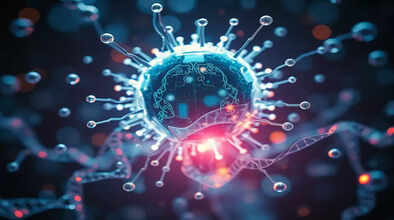Tech: Ai Changed DNA Sequencing Created Virus In A New Research Raising Concern Of Biological Terrorism..

AI Changed DNA Sequencing: Could a machine ever change the very foundation of life? Until a few years ago, this idea seemed like science fiction. But now, artificial intelligence (AI) has turned it into reality. In a recent study, AI achieved in just a few minutes what even the world's most advanced labs had previously struggled to achieve. It altered DNA sequences and created deadly variants, like new viruses. Scientists are both happy and scared about this research. Happy because it will make it easier to develop medicines for serious diseases, while the negative aspect is that if this AI model falls into the wrong hands, it could lead to an increase in biological terrorism.
For the research, scientists selected 72 proteins that were associated with some deadly virus or toxin. Then, using AI tools, they created thousands of new variants of these proteins. These variants were then passed through a system called the Biosecurity Scanning System (BSS), which is used by DNA manufacturing companies to verify every order. Initially, most dangerous variants passed this screening undetected. However, when the system was upgraded, 97% of dangerous variants were detected. AI has some positive aspects, but also raises some concerns. To learn how AI will shape the future and to build a career in the field, register for the NBT Upskill AI Career Growth Workshop.
Scientists say, "A double-edged sword, it will be difficult to stop." Part of the research was published in the journal Science. According to it, it is now very easy to create new sequences of DNA or proteins with the help of AI. Some of the world's leading scientists were involved in this research, including Microsoft scientist Eric Horwitz, University of Birmingham's Nicole Wheeler, Timothy Wittman, BBN's Jacob Beal, and Twist Bioscience scientist James Diggins.
Eric Horwitz said, "This is not a one-time task. Just as we frequently update our mobile phones or computers, biosecurity systems must also be continuously improved. Otherwise, it's not difficult to create dangerous viruses using AI.' Nicole Wheeler said, 'AI can be used for major advancements in medicine and science, but it's a double-edged sword. If security is weak, it will be difficult to prevent the misuse of dangerous variants created by AI.'
Now, opinions are divided on making data public.
There is now a heated debate over whether research data should be made public. Some scientists want the data to be openly available so that further improvements can be made. However, experts fear that if dangerous variants and their designs are made available online, anyone could misuse them. Ultimately, the discussion ended with a tiered access system. This tiered access system means that the most sensitive data will be shared only with selected institutions and scientists. This data is monitored by the Geneva-based International Biosecurity and Biosafety Initiative for Science (IBBIS).
Disclaimer: This content has been sourced and edited from Navbharat Times. While we have made modifications for clarity and presentation, the original content belongs to its respective authors and website. We do not claim ownership of the content.

